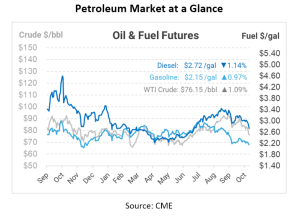
Effective Fueling Strategies to Stay Ahead of Winter
As the winter season approaches, it is essential for businesses relying on fuel to power their fleets and equipment to brace themselves for the distinct cold-weather challenges ahead. Since it accounts for almost half of all fuel deliveries, it’s crucial to keep comprehensive fueling strategies to stay ahead of winter, ensuring uninterrupted operation of machinery and vehicles.
The first step in preparing for winter fueling is to be aware of the transition dates specific to your region. These dates mark the onset of colder weather conditions, and planning around them is essential. For example, Minneapolis typically experiences its first fall frost around October 6th, while in Chicago, it occurs around October 29th. Knowing when these transitions are likely to happen will help you prepare your winter fueling strategy accordingly.
Understanding Fuel Gelling
One of the primary concerns during the winter is fuel gelling, which occurs as temperatures drop. Fuel gelling can be particularly problematic as it can lead to clogs in fuel filters and, in extreme cases, equipment malfunction. To combat fuel gelling, it’s essential to understand the three stages it goes through:
Cloud Point: During this initial stage, fuel becomes cloudy but remains operational. However, as temperatures continue to drop, wax accumulations start forming at the bottom of your fuel tank.
Cold Filter Plug Point: At this point, the wax accumulations can obstruct the flow of fuel through filters, causing operational issues.
Pour Point: Fuel solidifies to the point that it cannot be poured, making it unusable.
Fueling Strategies to Stay Ahead of Winter
To safeguard your operations from potential issues, it’s essential to take a proactive approach. This involves implementing a comprehensive set of measures aimed at maintaining the reliability of your fuel supply and the efficiency of your equipment. Here are essential steps to significantly reduce the risk of disruptions:
- Testing: Regularly test your fuel for cloud point, water content, and other relevant parameters. Early detection of nonconformities allows for timely intervention.
- Treating: Utilize specialized additives like Mansfield’s Arsenal ColdPro to lower the cloud point and cold filter plug point. These additives ensure that your fuel remains fluid even in frigid conditions. In very cold climates, kerosene may also be needed.
- Cleaning: Maintain clean fuel tanks through routine tank sweeps and fuel polishing to eliminate contaminants and prevent microbial growth. Neglecting tank cleanliness can lead to unexpected operational disruptions during the winter.
Scheduled Maintenance: Proactive and scheduled maintenance is essential to address the gradual buildup of contaminants in your fuel and tanks. Regular maintenance ensures that your equipment continues to function optimally throughout the winter season.
Choosing the Right Blend and Treatment
Crafting a winter fueling strategy to stay ahead of winter is a collaborative effort between your team and fuel providers. With the right strategy and proactive measures, you can minimize downtime, ensure fuel operability, and keep your operations running smoothly even in the harshest winter conditions.
Your Trusted Partner
Mansfield offers extensive coverage and has a proven track record of delivering effective solutions for businesses facing winter fueling challenges.
By working closely with Mansfield, you can benefit from our industry expertise, cutting-edge additives like ColdPro, and a commitment to delivering the solutions you need to keep your operations running smoothly during even the harshest winter conditions. With Mansfield, you can navigate the complexities of winter-fueling with confidence and peace of mind. Contact us today!

This article is part of Daily Market News & Insights
Tagged:
MARKET CONDITION REPORT - DISCLAIMER
The information contained herein is derived from sources believed to be reliable; however, this information is not guaranteed as to its accuracy or completeness. Furthermore, no responsibility is assumed for use of this material and no express or implied warranties or guarantees are made. This material and any view or comment expressed herein are provided for informational purposes only and should not be construed in any way as an inducement or recommendation to buy or sell products, commodity futures or options contracts.





